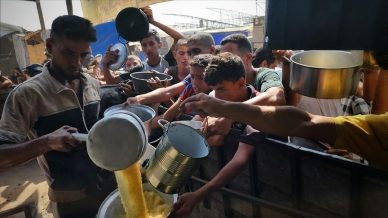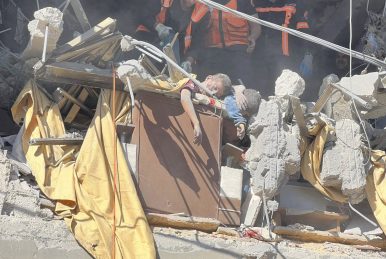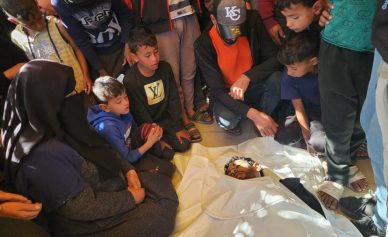GAZA, (PIC)
A human rights report by Human Rights Watch documents horrifying testimonies from women in the Gaza Strip, recounting their suffering and the consequences of war on their bodies and lives. It highlights the risks faced by pregnant Palestinian women, which also threaten the lives of newborns—not only due to bombs and shelling but also due to starvation, malnutrition, and the siege.
Among these women is Shaimaa Suhail Abu Jazar, who survived the Israeli genocide against Gaza but lost three of her children: Mohammed, Jinan, and Abdullah, who was born stillborn and lived only four minutes in her arms before the medical staff took him for burial. She also lost her husband Abdullah, with only her son Huzaifa and daughter Maryam surviving.
Shaimaa shares her story from a hospital in Qatar, describing the shell that pierced her foot while she was pregnant and how she miraculously survived. However, the suffering does not end with survival, as emphasized in the report by the international human rights organization titled “Five Babies in One Incubator: Violations of Rights of Pregnant Women During the Israeli Attack on Gaza.”
The report examines the Israeli siege imposed on the Gaza Strip and the attacks on health facilities in the region, describing their severe dangers. It states that “these actions threaten the lives of women during pregnancy, childbirth, and afterward,” concluding that “the illegal siege imposed by Israeli forces on the Gaza Strip, the severe restrictions on humanitarian aid, and attacks on medical facilities and healthcare workers have directly harmed women during pregnancy, childbirth, and postpartum.”
The organization points to the responsibility of the Israeli occupying authorities for violating “the right to the highest attainable standard of health, and other rights of women and pregnant women, including the right to decent and respectful healthcare throughout pregnancy, childbirth, and postpartum, as well as care for newborns.”
Lack of care and risk of death
Belkis Wali, the co-director of the Crisis and Conflict and Weapons Division at Human Rights Watch, notes that since the onset of the genocide against Gaza, women and girls have been experiencing pregnancies devoid of basic healthcare, sanitation, water, and food. They and their newborns are always exposed to preventable death risks.
Wali adds, “The blatant and repeated violations committed by Israeli authorities of international humanitarian law and human rights law in Gaza have a particular and acute impact on pregnant women and newborns. A ceasefire alone will not end these horrific conditions. Governments must pressure Israel to ensure that it urgently meets the needs of pregnant women and newborns, as well as others in need of healthcare.”
The report relied on testimonies and interviews with 17 individuals between June and December 2024, including eight Palestinian women who were pregnant during the war, and medical workers from international organizations and agencies operating in the Gaza Strip.
The report indicates that emergency services for obstetrics and newborns are available, albeit limited, in seven out of 18 hospitals partially operating across Gaza, as well as in four out of 11 field hospitals and one health center. It states that the quality of “healthcare that the few remaining medical facilities and service providers in Gaza can offer has significantly declined.”
This means that in many cases, women are hurriedly discharged from overcrowded hospitals, sometimes just hours after giving birth, to make room for other patients, many of whom are war casualties. Hospitals and health facilities operate under unsanitary conditions that witness overcrowding and severe shortages of essential health supplies, including medications and vaccines.
UNRWA ban
Human Rights Watch draws attention to the fact that the ban on UNRWA’s operations “threatens to exacerbate damage to the health of mothers and newborns.” The new laws prevent UNRWA from operating in occupied East Jerusalem, making it impossible for the agency to deliver aid to the occupied West Bank or Gaza, or to obtain permits or visas for its staff.
UNRWA provides water, food, shelter, and other vital services to hundreds of thousands of Palestinians in Gaza, including pregnant women, breastfeeding mothers, and newborns. Any access to the Gaza Strip or the West Bank or East Jerusalem is contingent upon Israeli approval, as those areas are under its occupation or control.
The Human Rights Watch report addresses the Israeli genocide against Palestinians in Gaza, which has resulted in over 50,000 martyrs. Statistics show that the majority of Palestinian martyrs are women and children (70%), with estimates indicating that thousands more remain under the rubble, not to mention the injured.
The war has also led to the forced displacement of over 90% of Gaza’s population, 1.9 million Palestinians, some of whom have been displaced multiple times. It highlights that “it has often been impossible to inform women about where they can safely access health services, and it has been difficult for women to safely reach the few available services in a timely manner. Women and newborns have received almost no medical follow-up and postpartum healthcare.”
Acts of genocide
The report also warns that information about the survival rates of newborns or the number of women with serious illnesses, or those who died during pregnancy, childbirth, or postpartum, is scarce due to the harsh conditions on the ground. Nevertheless, the report cites various studies, including one issued last July about maternal health, indicating that “the rate of spontaneous abortion in the Gaza Strip has increased by up to 300% since October 7, 2023.”
The illegal Israeli blockade of Gaza and the use of starvation as a method of warfare have led to severe food insecurity for most people. Pregnant women face enormous obstacles in maintaining adequate nutrition and a healthy diet essential for their health and fetal development. The report also refers to another report by the organization detailing how the occupation government deliberately deprives Palestinians of water, constituting a crime against humanity and an act of genocide.
Pregnant women reported experiencing dehydration or being unable to wash themselves, leading to various health issues or significantly exacerbating existing ones, including anemia, preeclampsia, bleeding, and sepsis, all of which can be fatal without appropriate medical treatment.
The Human Rights Watch report notes that the occupying authorities allow evacuation for pregnant women in only a few cases (as with most Palestinian injured and sick), despite international human rights law guaranteeing all civilians the right to leave their country for medical reasons and the right to return.
The organization asserts that the occupying authorities are also obligated under international humanitarian law to ensure that civilian populations have access to food, water, and medical supplies to the maximum extent possible, given the means available to the occupation government. “Under the law, Israeli authorities are required to allow the free passage of all shipments of medical supplies, hospitals, essential foodstuffs, clothing, and medical supplies designated for ‘children under fifteen and pregnant or postpartum women.’”
The international human rights organization urges “the allies of the occupation government, including the United States, to take all possible measures to end these serious Israeli violations.”
Human Rights Watch emphasizes the necessity for governments to halt military aid to Israel; to review bilateral agreements with the possibility of suspension, such as the EU-Israel Partnership Agreement, as proposed by the governments of Spain and Ireland; and to support the International Criminal Court and others in accountability efforts.
The organization also calls on governments to continue “supporting UNRWA’s efforts in Gaza, including providing all necessary resources for sexual and reproductive health services. They should also pressure Israel to ensure the unrestricted entry of sexual and reproductive health and mental health specialists into Gaza.”














